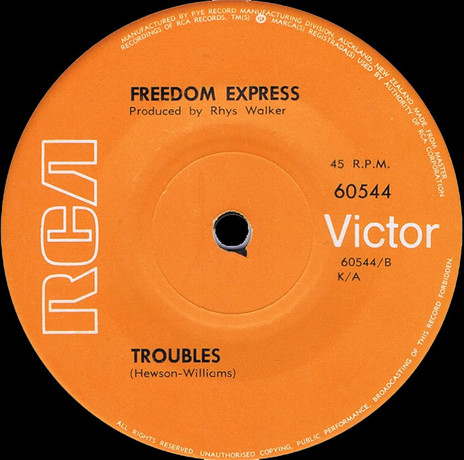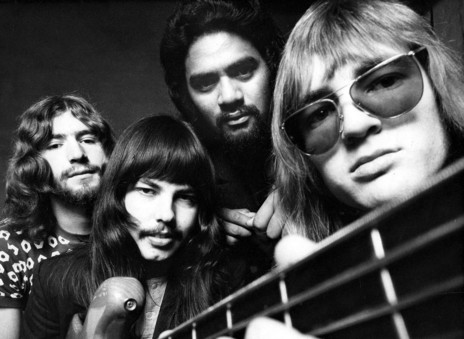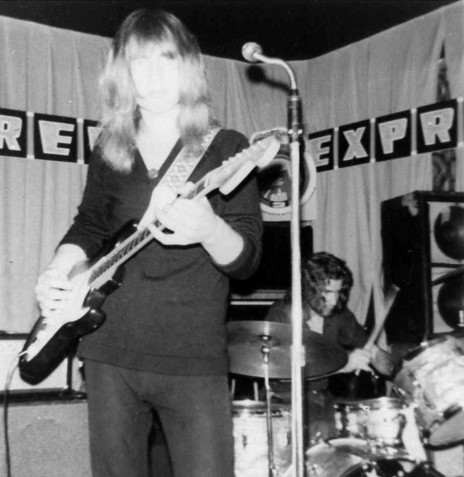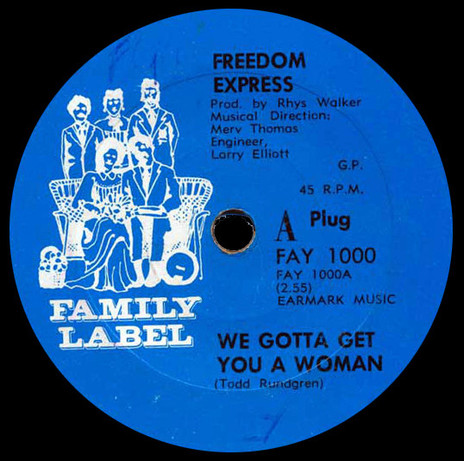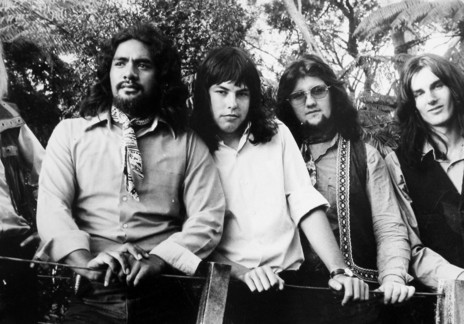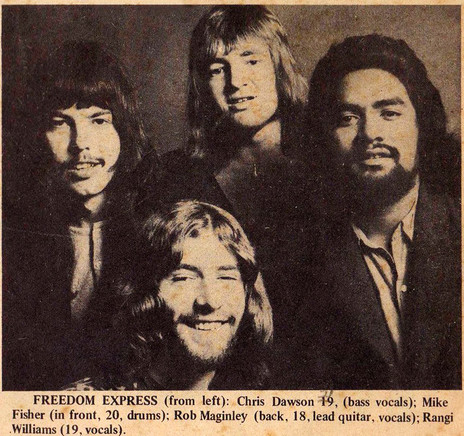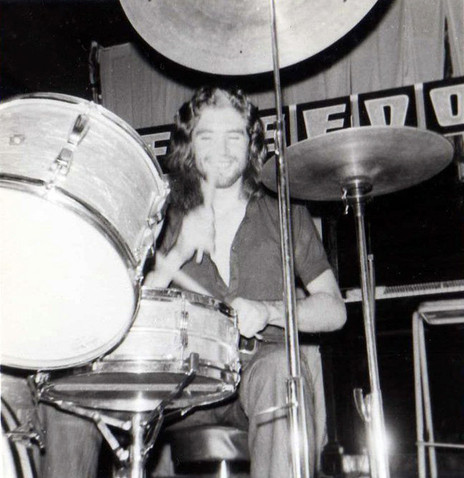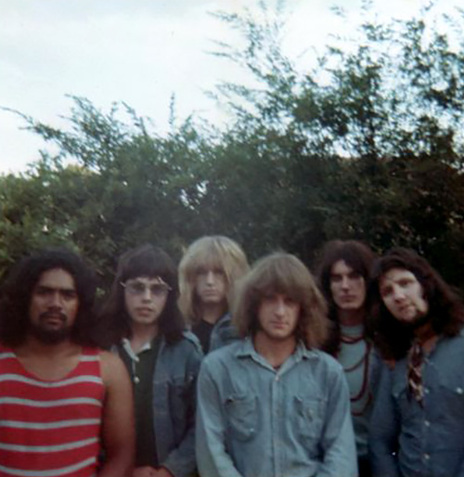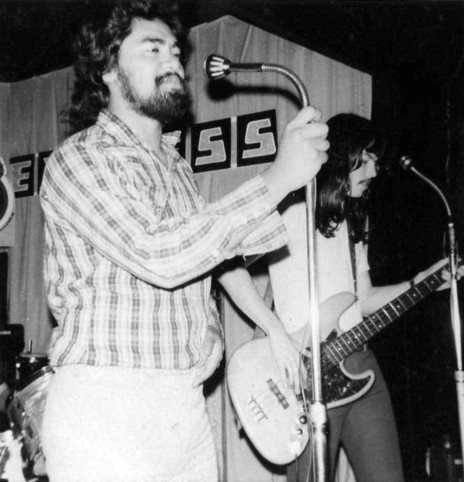They were rounded out by organist and songwriter Paul Hewson, bass guitarist Chris “Noddy” Dawson and new drummer Dennis Ryan, who had known them since his band The Entry played double bills with The Marble Arch at the Galaxie years earlier.
They released singles on RCA and Family before losing their gig at Aubrey’s, drifting to Christchurch and imploding back in Auckland in a haze of LSD.
Over the next two years theirs was a tumultuous existence with several personnel changes. They released singles on RCA and Family before losing their gig at Aubrey’s, drifting to Christchurch and imploding back in Auckland in a haze of LSD and a prison sentence that still has some band members crying foul.
1971 started well with Freedom Express taking up a residency at Don Lylian’s club Aubrey’s and Rangi Williams paying a visit to Pye Records A&R man Rhys Walker. Walker thought the band had promise but was particularly taken by Williams as a singer and performer and offered to help them make a record.
Before they ventured into Stebbing Recording Studio, former Hi-Revving Tongues drummer Rob Noad replaced Ryan. Produced by Walker, they recorded Little Richard’s ‘Freedom Blues’ b/w ‘Troubles’, written by Paul Hewson with help from Williams. Pye issued the single on the RCA label and it charted in Auckland and Wellington.
Around the same time, Freedom Express tried LSD. “One Sunday afternoon we turned up to play at Aubrey’s still tripping,” bass player Chris Dawson recalled. “Rob Noad wasn’t under the influence, but he knew something was going on!”
Hewson was growing frustrated with the Top 20 repertoire expected at Aubrey’s and quit to form Cinnamon House with Dennis Ryan and his half-brother guitarist Grant Ryan, where he could indulge in his new favourites The Band, Vanilla Fudge and Buddy Miles.
Freedom Express continued as a quartet, but when Cinnamon House bass player Greg Dineen quit, Dawson jumped ship too. “I joined Cinnamon House because they were a lot more musically interesting, playing songs by The Band for instance whereas Freedom Express were a bit cornier. There was an expectation at Aubrey’s that we should play the pop songs of the day.”
Bass player Craig Murray, formerly of The Apparition, joined Freedom Express, but within weeks Rob Noad quit. His replacement was an untried recent arrival from the South Island who had not long taken up the drums let alone been in a band.
Mike Fisher had learned everything he needed to know about drumming by spending a year watching Ricky Ball play with Ticket at Aubrey’s in Christchurch. When visiting Auckland club singer John Sumner informed him and Ticket of opportunities at Aubrey’s up north, Fisher needed no persuading.
“I decided to give that a go and jumped a plane northward to Freedom Express at the club for an audition,” Fisher said. “Rangi and Rob thought I had potential and gave me the gig. My first ever band too.”
But Craig Murray was none too happy playing with a novice after the short-lived luxury of locking in with Rob Noad and he left. His departure coincided with Chris Dawson’s conclusion that after nearly two months Cinnamon House were going nowhere. Dawson returned to Freedom Express and the band at last had some stability.
During the next six months they drew comparisons with Australian rock band Daddy Cool who were riding high with their mid-1971 hit ‘Eagle Rock’. Freedom Express supported them on both of their New Zealand visits as well as travelling as far south as Ali Baba’s in Wellington and to Tauranga under their own steam.
Early in 1972 another single was released, again produced by Rhys Walker but this time appearing on the Family label. The A-side was a version of Todd Rundgren’s ‘We Gotta Get You A Woman’, featuring Bob Smith on organ, backed with an unabashedly Daddy Cool interpretation of the standard, ‘Midnight Shift’.
Not long after, Paul Hewson asked to rejoin the band, but they voted against it. Don Lylian was unlikely to pay any more for an extra musician and Dawson was the only one in favour of his return, but Hewson’s own disparaging remarks about the band and the Aubrey’s scene since his departure most likely came back to haunt him.
“Paul and Rangi had become estranged after being close friends in the original Marble Arch,” Dawson said. “I think they just drifted apart. They were about 14 or 15 when they first played in The Marble Arch and people change a lot in those years. I don’t think there was any animosity, just different paths.”
In a music press article of January and February 1972, Freedom Express had revealed their admiration for Space Farm and Ticket, and when Space Farm disbanded later in the year, Rangi Williams set his sights on their bass guitarist, Billy Williams.
Maginley and Fisher initially resisted his plan to fire Dawson, but when Rangi insisted he would leave the band if Billy wasn’t instated, Dawson was down the road. With the inclusion of Billy Williams came an entirely different approach and a new keyboard player – Billy’s former Omnibus bandmate Paddy Gibbons.
“Paul Hewson came to see me shortly after this,” Dawson said. “He couldn’t believe that they had got Paddy on keyboards after rejecting his offer to join the band. I’m not sure what happened after that, but there was a lot of LSD happening.”
Out went the Daddy Cool pastiche and in came Hendrix and Zappa covers and new songs written by Rangi and Billy.
Out went the Daddy Cool pastiche and in came Hendrix and Zappa covers and new songs written by Rangi and Billy. It alienated the Aubrey’s regulars and was unacceptable to Don Lylian who promptly sacked them.
“It was a misguided attempt at progressive which backfired,” Fisher laughed. “Too much acid? I think so. Don Lylian wanted us to stay with our Daddy Cool clone period, which the Aubrey’s crowd loved. And so did Rob; he had quite different tastes from me and Rangi.”
Maginley and Gibbons quit when the rest of the band decided Christchurch was the place to be, after all that’s where Ticket was. So, Rangi Williams switched to bass guitar, Billy Williams would play lead and they set off with Fisher on drums and van driver Chook Conway on congas.
Once there they realised that as a lead guitarist, Billy Williams was a damn fine bass player. No work materialised, Fisher quit and the rest of them drifted back to Auckland. Fisher followed a few weeks later but – with Billy Williams invited to join BLERTA for a South Island tour, which included an appearance at the Loxene Golden Disc in November – the band was finished.
Although Rangi Williams was briefly in a group with Fisher and Grant Ryan in 1976, his behaviour was increasingly “out there” and he was eventually committed to residential care, a casualty of too much acid. Requests for an interview in 2013 got as far as submitting questions to his nurse, but Williams then refused to answer any.
At the start of 1973, Rob Maginley put together a new version of Freedom Express with original drummer Dennis Ryan, Cinnamon House bass player Greg Dineen and blues-rock singer Paul Hartland, who had been part of The Entry with Ryan.
They shared a residency at Levi’s Saloon with prog rock band Dragon. Ironically, it wasn’t until after its conclusion that Freedom Express invited Paul Hewson to return on keyboards for stints at The Do-Re-Mi and back at Aubrey’s. They even included a couple of Hewson’s songs.
But Freedom Express collapsed in the middle of the year when Rob Maginley was sentenced to a prison term on a charge some of his former bandmates allege was bogus. On his release he relocated to Australia.
Paul Hewson hooked up with Murray Grindlay and Red McKelvie in Cruise Lane before joining Dragon in Australia in July 1975, where he was their main songwriter as they became that country’s top band. Drummer Dennis Ryan also worked with Grindlay and McKelvie as one of the city’s top session musicians, while the man he replaced in Freedom Express, Mike Fisher, went on to play and record with Living Force. After his tour with BLERTA, Billy Williams joined a revamped Ticket.
